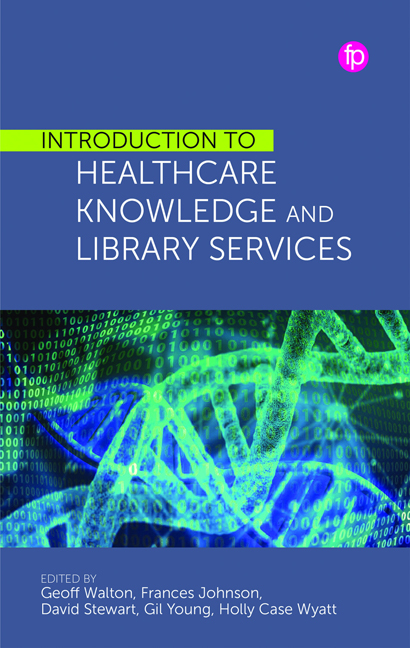Book contents
- Frontmatter
- Contents
- Figures, Tables and Case Studies
- Notes on Contributors
- Foreword
- How to Use this Book
- 1 An Introduction to Healthcare Knowledge and Library Services
- 2 Strategic Development for Healthcare Knowledge and Library Services
- 3 Exploring the Training and Development Needs of the Healthcare Knowledge and Library Services Workforce: A Case Study
- 4 Advocacy and How Knowledge and Library Specialists Tailor Services to Meet the Needs of Their Stakeholders
- 5 Mobilising Evidence and Knowledge
- 6 Internal and External Partnerships
- 7 Health Literacy, Patient Information and Combating Misinformation
- 8 Resource Discovery and Open Access
- 9 Growing the Evidence Base in Healthcare Knowledge and Library Services
- 10 Measuring Progress, Value and Impact in NHS Knowledge and Library Services
- 11 Reflective Practice in Healthcare Settings
- 12 Looking to the Future of Healthcare Knowledge Services
- Index
11 - Reflective Practice in Healthcare Settings
Published online by Cambridge University Press: 22 February 2024
- Frontmatter
- Contents
- Figures, Tables and Case Studies
- Notes on Contributors
- Foreword
- How to Use this Book
- 1 An Introduction to Healthcare Knowledge and Library Services
- 2 Strategic Development for Healthcare Knowledge and Library Services
- 3 Exploring the Training and Development Needs of the Healthcare Knowledge and Library Services Workforce: A Case Study
- 4 Advocacy and How Knowledge and Library Specialists Tailor Services to Meet the Needs of Their Stakeholders
- 5 Mobilising Evidence and Knowledge
- 6 Internal and External Partnerships
- 7 Health Literacy, Patient Information and Combating Misinformation
- 8 Resource Discovery and Open Access
- 9 Growing the Evidence Base in Healthcare Knowledge and Library Services
- 10 Measuring Progress, Value and Impact in NHS Knowledge and Library Services
- 11 Reflective Practice in Healthcare Settings
- 12 Looking to the Future of Healthcare Knowledge Services
- Index
Summary
Introduction
The ability to reflect on what we do and how we do it is an essential strategy for health professionals working in healthcare organisations. The art of reflection enables practitioners to improve patient care, develop skills and knowledge, improve the quality of services and enhance organisational development. Many higher education courses for healthcare professionals include reflective practice as part of the curriculum. The ability to reflect continues to be relevant throughout careers as it is embedded within ongoing professional development, including revalidation, team debriefs and personal reflection on experiences.
The purpose of this chapter is to help knowledge and library staff to develop these skills. It will encourage the reader to consider the importance of being a reflective practitioner for personal development and to understand how to provide services that also enable healthcare professionals to develop their skills. Furthermore, we will explore how a reflective practice approach is used for team reflection in both healthcare teams and knowledge and library services to facilitate ongoing improvement.
As this book aims to be a practical guide, there will be a summary of some key theories relating to the discipline and models that can be applied to improve reflective practice, alongside some hints and exercises for writing reflectively. A number of case studies are included from people working in knowledge and library services to provide real-life examples of how reflective practice is integral to healthcare professionals working in healthcare organisations.
Theories of reflective practice
There is a huge body of literature relating to reflective practice. This chapter will not provide an exhaustive list but will focus on a couple of theories that will be useful for putting reflective practice into perspective.
The Chartered Institute for Professional Development
The Chartered Institute for Professional Development (CIPD) defines reflective practice as ‘the foundation of professional development’ (CIPD, 2018). It highlights that adopting an approach of reflective practice helps professionals to make meaning from experiences and develop practical strategies for personal growth and organisational impact. Reflective practice is a personal learning journey, enabling practitioners to consider what they can learn from their experiences and develop plans to make changes in the future.
Donald Schon
In his book The Reflective Practitioner, Schon (1991) states that reflection can happen in two ways. First, he describes ‘reflection-in-action’, which is a process of reflecting during an experience or activity.
- Type
- Chapter
- Information
- Introduction to Healthcare Knowledge and Library Services , pp. 183 - 202Publisher: FacetPrint publication year: 2024



